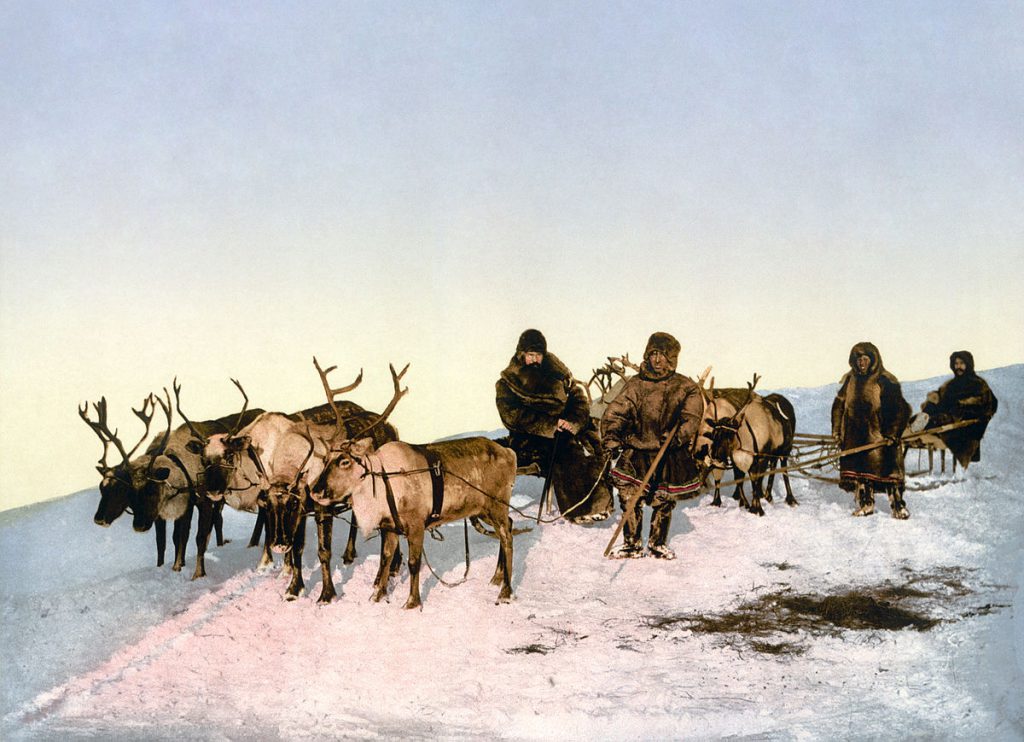Reindeer = rein + deer?
In linguists’ jargon, a ‘folk etymology’ refers to a change that brings a word’s form closer to some easily analyzable meaning. A textbook example is the transformation of the word asparagus into sparrowgrass in certain dialects of English.
Although clear in theory, it is not easy to decide whether ‘folk etymology’ is called for in other cases. One which has incited heated coffee-time discussion in our department is the word reindeer. The word comes ultimately from Old Norse hreindyri, composed of hreinn ‘reindeer’ and dyri ‘animal’. In present-day English, some native speakers conceive of the word reindeer as composed of two meaningful parts: rein + deer. This is something which, in the Christian tradition at least, does make a lot of sense. Given that the most prominent role of reindeer in the West is to serve as Santa’s means of transport, an allusion to ‘reins’ is unsurprising. This makes the hypothesis of folk etymology plausible.
 When one explores the issue further, however, things are not that clear. The equivalent words in other Germanic languages are often the same (e.g. German Rentier, Dutch rendier, Danish rensdyr etc.) even though the element ren does not refer to the same thing as in English. However, unlike in English, another way of referring to Rudolf is indeed possible in some of these languages that omits the element ‘deer’ altogether: German Ren, Swedish ren, Icelandic hreinn, etc.
When one explores the issue further, however, things are not that clear. The equivalent words in other Germanic languages are often the same (e.g. German Rentier, Dutch rendier, Danish rensdyr etc.) even though the element ren does not refer to the same thing as in English. However, unlike in English, another way of referring to Rudolf is indeed possible in some of these languages that omits the element ‘deer’ altogether: German Ren, Swedish ren, Icelandic hreinn, etc.
Another thing that may be relevant is the fact that the word ‘deer’ has narrowed its meaning in English to refer just to a member of the Cervidae family and not to any living creature. Other Germanic languages have preserved the original meaning ‘animal’ for this word (e.g. German Tier, Swedish djur).
Since reindeer straightforwardly descends from hreindyri, it may seem that, despite the change in the meaning of the component words, we have no reason to believe that the word was altered by folk etymology at any point. However, the story is not that simple. Words that contained the diphthong /ei/ in Old Norse do not always appear with the same vowel in English. Contrast, for example, ‘bait’ [from Norse beita] and ‘hail’ [from heill] with ‘bleak’ [from bleikr] and ‘weak’ [from veikr]). An orthographic reflection of the same fluctuation can be seen in the different pronunciation of the digraph ‘ei’ in words like ‘receive’ and ‘Keith’ vs ‘vein’ and weight’. It is, thus, not impossible that the preexistence of the word rein in (Middle) English tipped the balance towards the current pronunciation of reindeer over an alternative one like “reendeer”. Also, had the word not been analyzed by native speakers as a compound of rein+deer, it is not unthinkable that the vowels may have become shorter in current English (consider the case of breakfast, etymologically descending from break + fast).
So, is folk etymology applicable to reindeer? The dispute rages on. Some of us don’t think that folk etymology is necessary to explain the fate of reindeer. That is, the easiest explanation (in William of Occam’s sense) may be to say that the word was borrowed and merely continued its overall meaning and pronunciation in an unrevolutionary way.
Others are not so sure. The availability of “fake” etymologies like rein+deer (or even rain+deer before widespread literacy) seems “too obvious” for native speakers to ignore. The suspicion of ‘folk etymology’ might be aroused by the presence of a few mild coincidences such as the “right” vowel /ei/ instead of /i:/, the fact that the term was borrowed as reindeer rather than just rein as in some other languages [e.g. Spanish reno] or by the semantic drift of deer exactly towards the kind of animal that a reindeer actually is. These are all factors that seem to conspire towards the analyzability of the word in present-day English but which would have to be put down to coincidence if they just happened for no particular reason and independently of each other. Even if no actual change had been implemented in the pronunciation of reindeer, the morphological-semantic analysis of the word has definitely changed from its source language. Under a laxer definition of what folk etymology actually is, that could on its own suffice to label this a case of folk etymology.
There seems to be, as far as we can see, no easy way out of this murky etymological and philological quagmire that allows us to conclude whether a change in the pronunciation of reindeer happened at some point due to its analyzability. To avoid endless and unproductive discussion one sometimes has to know when to stop arguing, shrug and write a post about the whole thing.